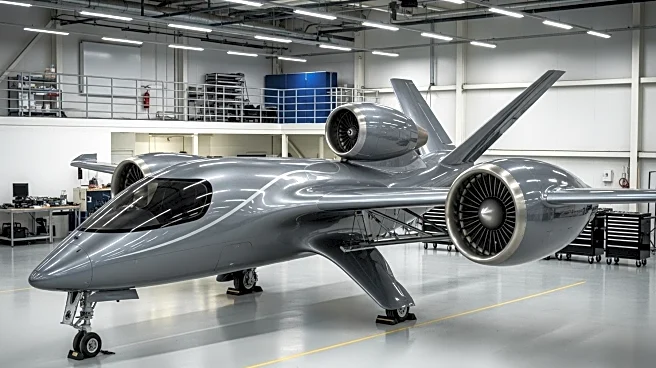What's Happening?
Horizon Aircraft has selected Pratt & Whitney Canada's PT6A engine for its hybrid electric Vertical Take-Off and Landing (eVTOL) aircraft, the Cavorite X7. This decision marks a significant step in Horizon's
development of one of the world's first hybrid eVTOLs, designed to operate like a conventional aircraft while offering enhanced speed, range, and efficiency. The PT6A engine is renowned for its reliability and efficiency, making it an ideal choice for the Cavorite X7, which aims to reduce hydrocarbon emissions by up to 30% compared to traditional aircraft. Horizon Aircraft plans to complete testing and certification of the Cavorite X7 and scale production to meet demand from various sectors.
Why It's Important?
The selection of the PT6A engine underscores Horizon Aircraft's commitment to developing advanced air mobility solutions that prioritize performance and environmental sustainability. The hybrid design of the Cavorite X7 addresses real-world operational challenges, such as the lack of battery charging infrastructure in remote areas, making it suitable for military, emergency, and commercial applications. This development highlights the growing influence of Canadian companies in the global aerospace industry and the potential for hybrid eVTOLs to transform air travel by offering more efficient and versatile options.
What's Next?
Horizon Aircraft is focused on completing the testing and certification of the Cavorite X7, with plans to scale production to meet anticipated demand. The collaboration with Pratt & Whitney Canada strengthens Horizon's position in the advanced air mobility sector and may lead to further partnerships and innovations. As the eVTOL market evolves, Horizon's hybrid approach could set a precedent for other manufacturers seeking to balance performance with environmental considerations. The success of the Cavorite X7 could influence regulatory frameworks and market acceptance of hybrid eVTOLs.
Beyond the Headlines
The development of hybrid eVTOLs like the Cavorite X7 raises important questions about the future of aviation and the integration of new technologies into existing infrastructure. The hybrid design offers a pragmatic solution to current limitations in battery technology, potentially accelerating the adoption of eVTOLs in various sectors. The collaboration between Horizon Aircraft and Pratt & Whitney Canada also highlights the role of established aerospace companies in supporting innovation and sustainability in the industry. As hybrid eVTOLs gain traction, they may drive changes in regulatory standards and public perception of air travel.











